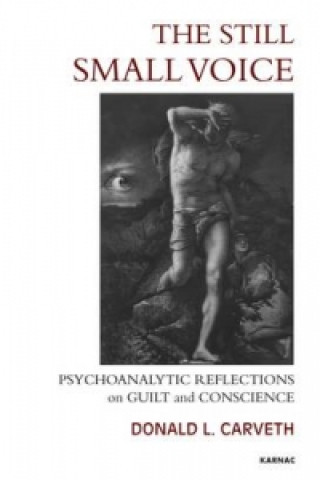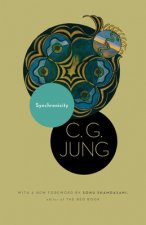
Kód: 01992273
Still Small Voice
Autor Donald L Carveth
Whereas Freud himself viewed conscience as one of the functions of the superego, in The Still Small Voice: Psychoanalytic Reflections on Guilt and Conscience, Carveth argues that superego and conscience are distinct mental functio ... celý popis
- Jazyk:
 Angličtina
Angličtina - Väzba: Brožovaná
- Počet strán: 352
Nakladateľ: Taylor & Francis Ltd, 2013
- Viac informácií o knihe

Mohlo by sa vám tiež páčiť
-

Rachmaninov: Sheet Music for Piano
12.36 € -13 % -

Alone
18.39 € -13 % -

Can't Hurt Me
31.87 € -

Rainwater Infiltration in Urban Areas
149.52 € -

Take a Number, Darling
22.92 € -

Piezoelectric Sensors and Actuators
318.55 € -

Philip K. Dick's Electric Dreams
20.81 € -

Ballenesque
79.23 € -5 % -

The Beginner's Photography Guide
17.69 € -15 % -

Arthur Turns Green
10.15 € -

Beaches
38.50 € -14 % -

Graveyard Book
10.35 € -

Young's Analytical Concordance to the Bible
30.56 € -

Problems in Real Analysis
141.17 € -

New Perspectives on People and Forests
209.05 € -

Action, Decision, and Intention
68.77 € -

Hip Hop Coloring Book
8.84 € -23 % -

Febrile Neutropenia
68.77 € -

Stadt als System
15.17 € -

OEsterreichs Kampfe im Jahre 1866
60.83 € -

Tancerka krawędzi. Archiwum burzowego światła
8.34 €
Darčekový poukaz: Radosť zaručená
- Darujte poukaz v ľubovoľnej hodnote, a my sa postaráme o zvyšok.
- Poukaz sa vzťahuje na všetky produkty v našej ponuke.
- Elektronický poukaz si vytlačíte z e-mailu a môžete ho ihneď darovať.
- Platnosť poukazu je 12 mesiacov od dátumu vystavenia.
Viac informácií o knihe Still Small Voice
Nákupom získate 179 bodov
 Anotácia knihy
Anotácia knihy
Whereas Freud himself viewed conscience as one of the functions of the superego, in The Still Small Voice: Psychoanalytic Reflections on Guilt and Conscience, Carveth argues that superego and conscience are distinct mental functions and that, therefore, a fourth mental structure, the conscience, needs to be added to the psychoanalytic structural theory of the mind. He claims that while both conscience and superego originate in the so-called pre-oedipal phase of infant and child development they are comprised of contrasting and often conflicting identifications. The primary object, still most often the mother, is inevitably experienced as, on the one hand, nurturing and soothing and, on the other, as frustrating and persecuting. Conscience is formed in identification with the nurturer; the superego in identification with the aggressor. There is a principle of reciprocity at work in the human psyche: for love received one seeks to return love; for hate, hate (the talion law).Like Franz Alexander and Sandor Ferenczi before him, Carveth views the therapeutic task as elimination of the superego. But unlike his forebears he does not propose its replacement by the rational ego for, in his view, rationality cannot serve as the source of values. Following Jean-Jacques Rousseau, he finds the roots of morality not in reason but in feeling, in sympathetic identification or "pity." With Pascal, he holds that "the heart has reasons reason cannot know." Such "reasons of the heart" form the core of conscience. Unlike the torments inflicted by the demonic superego that merely uses transgression as an excuse to do what it wants-punish and torment the ego-the conscience, what Winnicott called "the capacity for concern," is genuinely troubled by failures to love. The author claims we must face our bad conscience, acknowledge and bear genuine (depressive) guilt, and through contrition, repentance and reparation come to accept reconciliation and forgiveness, or be forced to suffer the torments of the damned-persecutory guilt inflicted by the sadistic internal persecutor and saboteur, the superego.It is the author's view that in human history the damage done by id-driven psychopaths amounts to nothing compared to that brought about by superego-driven ideologists. Freud and subsequent psychoanalysis has largely whitewashed the superego while demonising the id, the alleged "beast" in man, when in reality animals are seldom beastly, at least not in the ways humans often are. While aware of its destructiveness in the clinical realm, psychoanalysts have largely ignored the ideologies of domination-the sexism, racism, heterosexism, classism and childism-that are internalised from unconscionable societies into the unconscionable superego.In the penultimate chapter, drawing on the work of Hannah Arendt, Terry Eagleton and others, Carveth critically reviews the concepts of psychopathy and evil. In the final chapter, he advocates a demythologising, deliteralising or deconstructive approach to the Bible as metaphor, but one that escapes Freud's derogation of this approach by acknowledging, with Hegel at his most honest, that its result is a humanistic ethic no longer to be equated with religion.
 Parametre knihy
Parametre knihy
Zaradenie knihy Knihy po anglicky Society & social sciences Psychology Psychological theory & schools of thought
71.28 €
- Celý názov: Still Small Voice
- Autor: Donald L Carveth
- Jazyk:
 Angličtina
Angličtina - Väzba: Brožovaná
- Počet strán: 352
- EAN: 9781780491684
- ISBN: 1780491689
- ID: 01992273
- Nakladateľ: Taylor & Francis Ltd
- Hmotnosť: 538 g
- Rozmery: 156 × 229 × 33 mm
- Dátum vydania: 01. June 2013
Obľúbené z iného súdka
-

The Empathy Game
17.99 € -

Red Book
245.55 € -15 % -

A General Introduction to Psychoanalysis
5.62 € -23 % -

Inner Gold
21.81 € -

Ego and the Id
4.01 € -12 % -

Man's Search for Meaning, Gift Edition
22.82 € -14 % -

Secret World of Drawings
20.50 € -23 % -

Psychoanalytic Diagnosis
58.82 € -

Situation Is Hopeless But Not Serious
15.88 € -4 % -

Analysis, Repair and Individuation
75 € -

Dark Side of the Inner Child
24.63 € -10 % -

Archetypal Process
42.63 € -

Ape that Understood the Universe
26.84 € -15 % -

Four Archetypes
22.72 € -5 % -

Between Losing and Finding
33.37 € -

Threshold Experiences
40.01 € -

Social Psychology: A Very Short Introduction
11.96 € -14 % -

Behave
12.96 € -12 % -

The Red Book – A Reader`s Edition
38.50 € -14 % -

Emotional Intelligence
10.35 € -11 % -

Synchronicity – An Acausal Connecting Principle
14.27 € -

The Sublime Object of Ideology
17.89 € -6 % -

Memories, Dreams, Reflections
15.88 € -

Make It Stick
34.48 € -

Civilization and Its Discontents
10.95 € -15 % -

Choice Factory
16.28 € -23 % -

No Boundary
17.29 € -23 % -

Problem of the Puer Aeternus
26.34 € -

Answer to Job
9.44 € -14 % -

Carl Jung: Wounded Healer of the Soul
26.94 € -23 % -

Psychoanalyst Meets Marina Abramovic
20.10 € -

The Interpretation of Dreams
5.62 € -23 % -

Dreams
22.01 € -

Ego and Archetype
25.83 € -23 % -

Great Mother
29.35 € -4 % -

How To Read Lacan
12.06 € -22 % -

Integral Psychology
29.15 € -13 % -

Archetypes and the Collective Unconscious
54.49 € -

Freud and Beyond
23.72 € -

Home is Where We Start from
14.17 € -23 % -

Jung's Studies in Astrology
51.58 € -

Projection and Re-collection in Jungian Psychology
32.57 € -

Dreams
19.50 € -11 % -

Beyond the Pleasure Principle
14.17 € -23 % -

Red Book of C.G. Jung
41.42 € -

Quantum Mind
31.46 € -

Ecrits
32.37 € -8 % -

Civilization and its Discontents
7.33 € -13 % -

Why We Buy
16.88 € -15 %
Osobný odber Bratislava a 2642 dalších
Copyright ©2008-24 najlacnejsie-knihy.sk Všetky práva vyhradenéSúkromieCookies



 21 miliónov titulov
21 miliónov titulov Vrátenie do mesiaca
Vrátenie do mesiaca 02/210 210 99 (8-15.30h)
02/210 210 99 (8-15.30h)